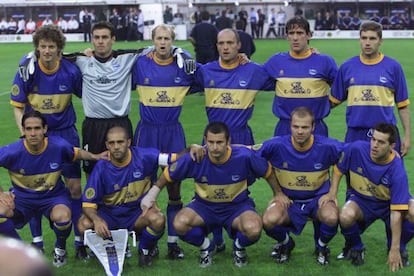Civil war erupts at Alavés
2001 Uefa Cup finalist club has launched legal battle against its own players

Eleven years ago, some 11,000 fans of Deportivo Alavés were in Dortmund. Eleven thousand throats roared the team on and 22,000 hands rubbed the same number of eyes to rule out the possibility that a mirage was unfolding in front of them. Alavés was in the Uefa Cup final, playing against Liverpool.
Now languishing in Segunda División B, Alavés supporters are watching a different kind of illusion play out at the Mendizorroza stadium in Vitoria. With less than a week until pre-season begins the club has 10 players, not even enough to field a team. Two weeks ago, there was only one.
Of the 22 players that made up the squad last season only two remain. The rest are caught up in a legal battle after the club opened judicial proceedings against the entire squad for "lack of commitment and professionalism," following a run of bad results.
The two players who remain, Asier Salcedo and Oscar Rubio, are the only ones who do not figure in the police complaint filed against Alavés by the squad after the Basque club's extraordinary move. According to a club spokesman, the situation at Mendizorroza is plain: "The president has already said it; no player who acts against the club will play in the team."
The story began last April, after the side had lost a match against Logroñés. The result came on the back of a string of bad results and the board of administrators took the decision to sanction the players. The opening of the proceedings gave rise to fines of between 600 and 3,000 euros according to the player's contract. It did not matter whether the player was in the team or not, or how much field time he put in. "The club went too far," says a member of supporters' group Accionistas Albiazules. "It is on to a loser."
The squad, with the support of the Spanish Footballers' Association (AFE), decided to report the club. "It is not usual for a disciplinary proceeding to be opened against an entire squad," noted an AFE spokesman. Last Friday, bridges were rebuilt at an act of conciliation in Vitoria. At the meeting was Alavés president Avelino Fernández de Quincoces, a surprise that the AFE described as "good news." The two sides said negotiations will continue and a solution sought.
The club's lawsuit cites the players' "lack of commitment and professionalism"
On the sporting side, though, the club has little time to beef up its playing staff. Eight new arrivals have increased the club's squad to 10 players but there is little time before pre-season. "We are not in a hurry," say club sources.
This will be the fourth year that Alavés has been in Segunda B. During that time three technical secretaries, five coaches and three presidents have come and gone.
"Continuity has to start from now," says a club spokesman, who adds the latest board of directors arrived too late at the end of last season to be able to anything positive about the situation.
The basketball team Saski Baskonia, also based in Vitoria, has been the club's main sponsor for a little over a year. In 2007 Alavés entered into voluntary administration after the stewardship of the eccentric Ukrainian-American businessman Dmitry Piterman left it in financial tatters. His presidency, which ran from 2004 to 2007, generated debts of 25 million euros that took the club to the brink of financial meltdown - a situation it has yet to recover from. The budget for the 2012-13 season will be half a million euros less than last year, the club has stated.
It is a far cry from 2001, when after a 4-4 tie after 90 minutes Alavés stood on the cusp of history. An own goal from Delfí Geli denied the club its crowning moment and two seasons later it was relegated to Segunda. Dortmund seems a long time ago at Mendizorroza.
Tu suscripción se está usando en otro dispositivo
¿Quieres añadir otro usuario a tu suscripción?
Si continúas leyendo en este dispositivo, no se podrá leer en el otro.
FlechaTu suscripción se está usando en otro dispositivo y solo puedes acceder a EL PAÍS desde un dispositivo a la vez.
Si quieres compartir tu cuenta, cambia tu suscripción a la modalidad Premium, así podrás añadir otro usuario. Cada uno accederá con su propia cuenta de email, lo que os permitirá personalizar vuestra experiencia en EL PAÍS.
¿Tienes una suscripción de empresa? Accede aquí para contratar más cuentas.
En el caso de no saber quién está usando tu cuenta, te recomendamos cambiar tu contraseña aquí.
Si decides continuar compartiendo tu cuenta, este mensaje se mostrará en tu dispositivo y en el de la otra persona que está usando tu cuenta de forma indefinida, afectando a tu experiencia de lectura. Puedes consultar aquí los términos y condiciones de la suscripción digital.









































